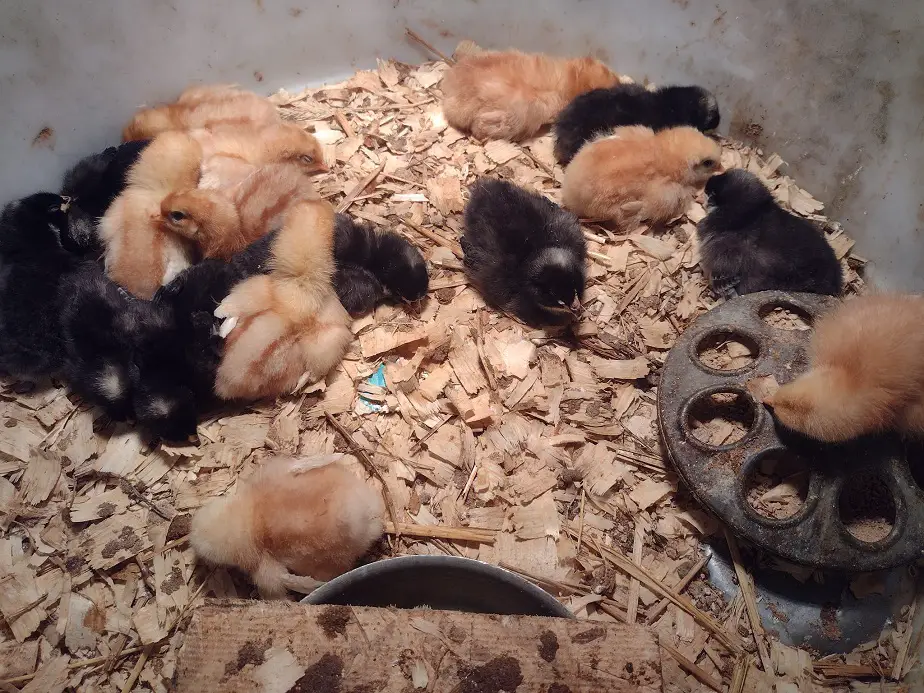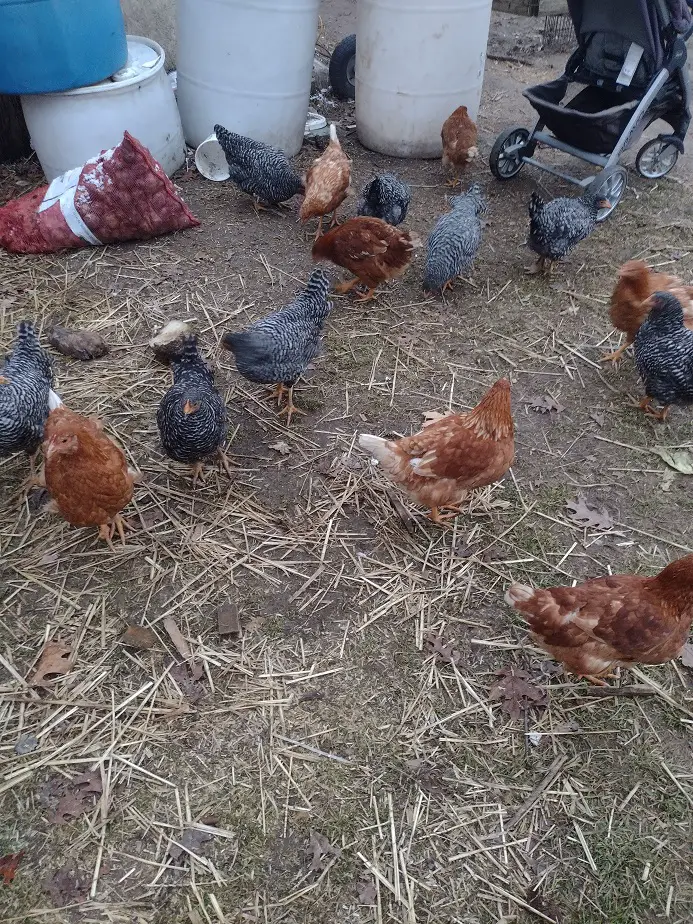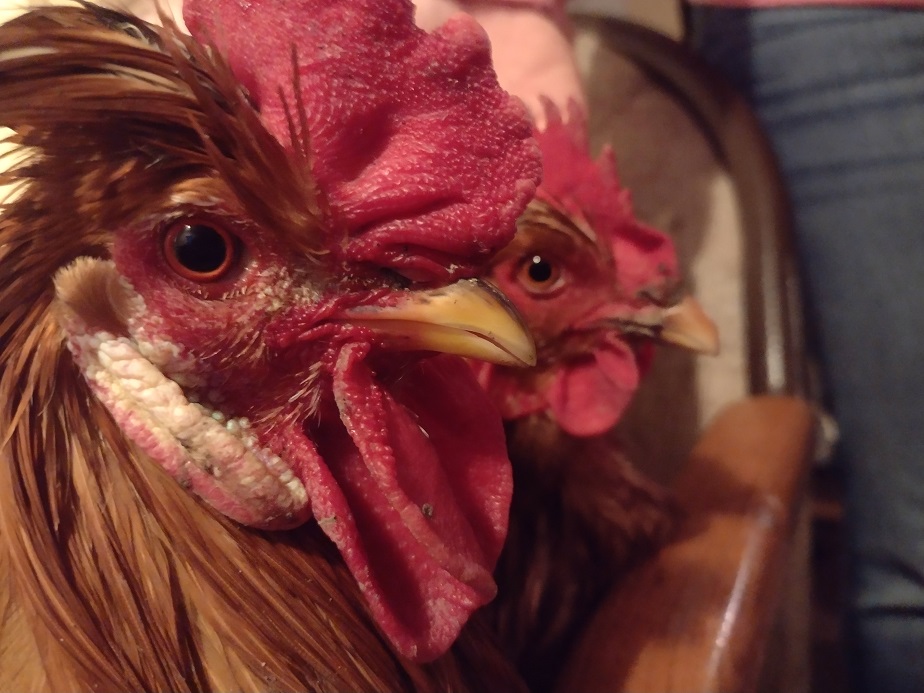We’ve had some chickens with clipped beaks, but most of ours have full beaks.
Chicks should not need beaks clipped. Clipping beaks is a way to minimize cannibalistic pecking, which is usually a result of housing stress, overpopulation, or malnutrition. Clipping chick’s beaks doesn’t address the underlying issues and has a negative effect on the chicken’s growth and long-term health.
Here’s why it’s done and why you don’t need to do it.

Why are Chick’s Beaks Clipped?
Clipping the beaks of young chicks started in the commercial egg industry. It’s almost universally done on cage-free farms. Clipping, or debeaking, is cutting off 25-30 percent of the chick’s beak. Sometimes it’s done a little more on the top part of the beak. It prevents the beak from forming a point.
We had three hens with clipped beaks. I got them from someone else who had it done. Many times, ordering chicks, you will have the option to have their beaks clipped or to be de-beaked. It’s completely not needed, but the old “experts” usually say it’s needed. It’s not needed.
Clipped beaks are fatter and rounder at the end, and don’t close together as closely. Oftentimes a trimmed beak won’t close completely at all. that’s the point. It makes the beak weaker and less efficient as a pecking instrument. As if chickens don’t need that.
In commercial poultry operations, there is a lot of stress. There have been numerous studies showing that overstressed animals tend to develop damaging behaviors including cannibalistic tendencies. In chickens, it’s in three categories: Pecking, vent pecking, and cannibalistic pecking.
They’re all a problem and all damaging. General pecking causes birds to lose feathers and gives them tender spots. Vent pecking is when a chicken gets pecked around the rear orifice. That being a more sensitive and bare area causes more damage. Cannibalistic pecking is pecking to and beyond the point of open flesh.
It’s horrible and I’ve seen numerous pecked chickens in other’s flocks. But, never in my own flocks after raising around 250 birds. The research says it’s usually stress and diet-related. I agree completely. When I’ve seen pecking problems, it’s usually been a heavily populated coop and/or poorly fed birds.

Dealing With Pecking Without Debeaking
There are three ways to deal with pecking: Remove the pecked bird, remove the peckers, or locate and remedy the stress points. Often, more than one action is required. Once a flock begins to peck, it becomes a learned behavior and can be hard to remedy. It needs to be taken seriously and addressed.
I have dealt with severely pecked birds from others’ flocks. My best remedy is to let them free-range for a time. And I mean real free-range. Let the birds get all the clean dirt, fresh grass, bugs, and sunshine they want. Often, pecking is related to boredom, much like pigs biting each other’s tails.
Let chickens be chickens. If they have range to roam, they will be too busy being chickens and pecking at everything else to peck at each other. Problem pecking is like a last resort thing. If there’s nothing else to do, they may peck each other. Chickens were made to peck. Let them peck at nature.
Missing amino acids and minerals in a flock’s diet have been known to cause an increased likelihood of pecking issues. Not feeding enough or feeding an out-of-balance diet can increase problem pecking. I’m all for feeding birds cheaply. I seldom buy bagged chicken feed.
Make sure your birds get good protein, vitamins, and minerals from somewhere. Free ranging your birds gives them access to fresh greens, which is more than enough vitamins and minerals.
Sunlight also helps regulate birds’ natural instincts. When a flock of chickens are housed in a coop and doesn’t get out much, it can lead to problems. Fresh air and sunshine are good for the mental state of fowl, and all living animals really. Sunlight encourages healthy behaviors in chickens.
Artificial light helps but is not the same thing as natural sunlight. If that’s a problem for you, consider adding a few windows to your coop.
One of the most common stress points is overpopulation. Too many birds together in confinement is problematic. If you think that may be a stress point causing bad behaviors, consider thinning your flock or splitting it up into two coops.
If you have 50 hens in a coop, they will have a hard time establishing a proper social dominance and social structure. If let free-range, that 50 birds would likely form 3-5 different groups that hang together throughout the day. It’s healthier for them that way.
I know that free-ranging can be hard to do, but we should try to get as close to that as we reasonably can because that’s how chickens were designed to operate.
Related Articles:

